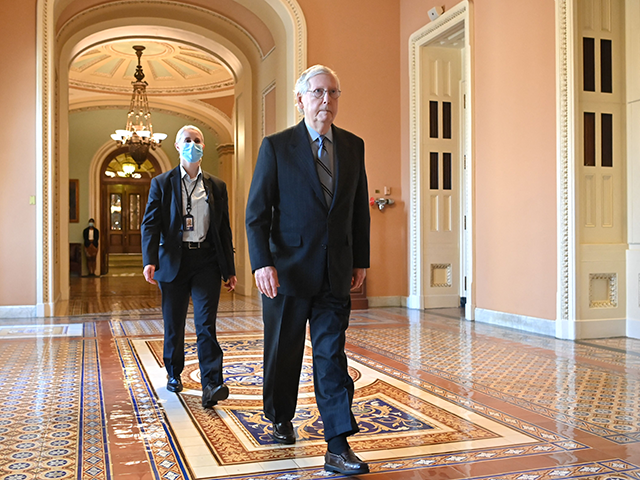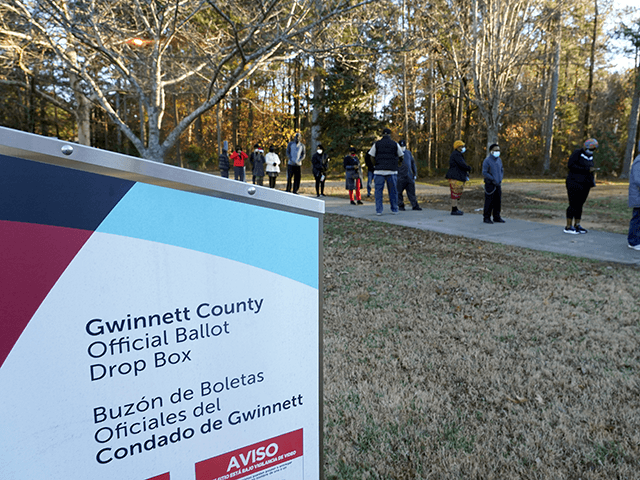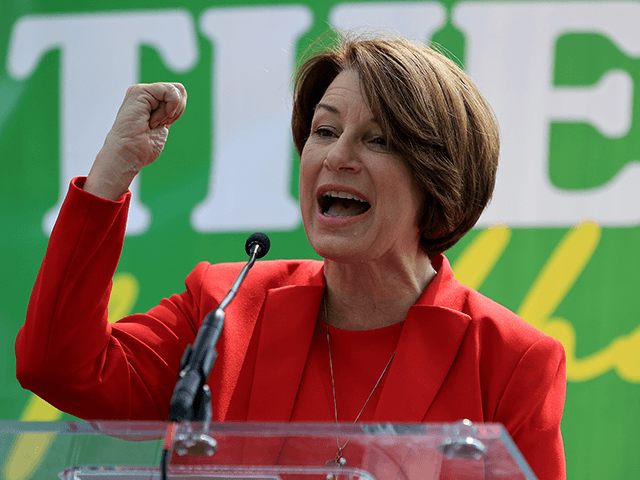Democrats are taking a third shot at efforts to nationalize elections this year through a bill introduced by Sen. Amy Klobuchar (D-MN) on Tuesday, the “Freedom to Vote Act.”
A previous effort, HR 1 – called the For the People Act by Democrats and The Corrupt Politicians Act by Republicans – passed the House of Representatives in March but failed to clear a procedural hurdle in the Senate on June 22 in a party line 50-50 vote when 60 votes were needed.
A second effort, the John Lewis Voting Rights Advancement Act, HR 4, passed the House of Representatives on August 24, but is expected to face the same procedural hurdle in the Senate encountered by HR 1.
“The Freedom to Vote Act will set basic national standards to make sure all Americans can cast their ballots in the way that works best for them, regardless of what zip code they live in,” a statement released by Klobuchar’s office on Tuesday stated:
U.S. Senator Amy Klobuchar (D-MN), Chairwoman of the Committee on Rules and Administration with oversight over federal elections and campaign finance law, joined with her colleagues to introduce the Freedom to Vote Act, legislation to improve access to the ballot for Americans, advance commonsense election integrity reforms, and protect our democracy from relentless attacks. The bill includes many of the crucial reforms in previous democracy reform legislation led by Senator Jeff Merkley (D-OR) and cosponsored by Klobuchar.
The legislation reflects feedback from state and local election officials the Rules Committee has heard throughout the year to ensure the people responsible for implementing reforms are able to do so effectively. It also elevates the voices of American voters by ending partisan gerrymandering and helping to eliminate the undue influence of secret money in our elections.
In addition to Klobuchar and Merkley, the bill is cosponsored by Sens. Tim Kaine (D-VA), Angus King (I-ME), Joe Manchin (D-WV), Alex Padilla (D-CA), Jon Tester (D-MT), and Reverend Raphael Warnock (D-GA).
Manchin’s cosponsorship of the bill is notable, because his opposition to banning the filibuster is cited by Democrats as one of the major reasons the earlier “For the People Act” failed to come to a vote in the U.S. Senate.
For that reason, the establishment media is calling the new “Freedom to Vote Act” a “compromise.”
“The proposal, which will be introduced by Senate Rules Chair Amy Klobuchar, also has the endorsement of Sen. Joe Manchin, the West Virginia Democrat who had been the lone member of his caucus to oppose his party’s more sweeping overhaul — known as the For the People Act — which passed the House earlier this year,” CNN reported Tuesday.
“Senate Democrats on Tuesday proposed a pared-down voting rights bill that has the backing of both progressives and centrists in an effort to present a united front against deep Republican resistance to new legislation setting nationwide election standards,” the New York Times reported:
The measure is the result of weeks of intraparty negotiations overseen by Senator Chuck Schumer, the New York Democrat and majority leader, and was built on principles put forward by Senator Joe Manchin III of West Virginia, the lone Democratic holdout against an earlier, much more sweeping piece of legislation called the For The People Act. Still, like that measure, it faces steep odds in the Senate, where it is unlikely to persuade Republicans to drop their opposition to legislation they have argued is an egregious overreach and an existential threat to their party.
The new bill, called the Freedom to Vote Act, drops some contentious elements of that initial bill such as restructuring the Federal Election Commission. It focuses heavily on guaranteeing access to the ballot following new voting restrictions being enacted around the country by Republican legislatures since the 2020 elections. And it would set a national voter identification standard — something that many Democrats have vehemently opposed — but one that would be far less onerous than some states have attempted to impose, allowing voters to meet the requirement with a variety of identification cards and documents in paper and digital form.
The revised measure would also require that states allow at minimum 15 consecutive days of early voting, including two weekends; ensure that all voters can request to vote by mail; establish new automatic voter registration programs, and make Election Day a national holiday. The legislation would mandate that states follow specific criteria when drawing new congressional districting lines and would force disclosure of donors to so-called dark money groups.
Senate Minority Leader Mitch McConnell (R-KY), quickly stated his opposition to the new proposal.
“There is no reason for the federal government to take over how we conduct elections,” McConnell said on Tuesday, Reuters reported.
“It is a solution in search of a problem, and we will not be supporting that,” McConnell added.

Senate Minority Leader Mitch McConnell (R-KY) returns to his office after voting at the U.S. Capitol after a Senate vote on the passage of a massive infrastructure plan in Washington, DC, on August 10, 2021. (Photo by MANDEL NGAN/AFP via Getty Images)
The text of the 594 page bill, however, reveals a significant number of national federal government usurpations of the constitutionally guaranteed authority of state legislatures to run elections in their own states, several of which go beyond what was included in the earlier “For the People Act.”
Most notably, the “Freedom to Vote” Act would require every state to implement drop boxes for the deposit of absentee vote by mail ballots, a controversial measure that critics say is an invitation to voter fraud. This requirement was not an element of the earlier “For the People Act.”
As of September 21, only 13 states have legally authorized the use of some form drop boxes for the deposit of absentee vote by mail ballots.
“The bill must have been authored by someone with amnesia about the problems of the 2020 election because it fails to address any of them, and in fact, converts the problems into policy and national law,” Phill Kline, executive director of the Amistad Project of the Thomas More Society, told Breitbart News in an exclusive interview.
“Elections at their core must be transparent. Removing the ability for representatives of both parties to be present in the counting room, and turning over the management of elections to a group of so called nonpartisan experts kicks the American people out of the counting room and eliminates transparency, the very problem and reason why most Americans doubt the 2020 election,” Kline continued.
“Elections are not that complicated. You accept ballots from people who are qualified to vote and then you count them. The problem is a box cannot identify whether a qualified voter cast the vote. Moreover, those areas with the Zuckerboxes proved themselves incompetent to maintain a proper chain of custody to the point that even the Sec of State of GA is calling for the Fulton County elections to placed in receivership due to their multiple failures. And that is the model for this bill,” Kline concluded.
The national usurpation of state legislative authority with regards to drop boxes is found is found in Section 1, Subtitle D-Voting by mail, Section 1305, Requiring States to provide secured drop boxes for voted ballots in elections for Federal office:
(a) REQUIREMENT.—Subtitle A of title III of the Help America Vote Act of 2002 . . . is amended . . .
SEC. 314. USE OF SECURED DROP BOXES FOR VOTED BALLOTS.
(a) REQUIRING USE OF DROP BOXES.—Each jurisdiction shall provide in-person, secured, and clearly labeled drop boxes at which individuals may, at any time during the period described in subsection (b), drop off voted ballots in an election for Federal office. . .
(d) NUMBER OF DROP BOXES.—Each jurisdiction shall have—(1) in the case of any election for Federal office prior to the regularly scheduled general election for Federal office held in November 2024, not less than 1 drop box for every 45,000 registered voters located in the jurisdiction; and (2) in the case of the regularly scheduled gen20 eral election for Federal office held in November 2024 and each election for Federal office occurring thereafter, not less than the greater of—
(A) 1 drop box for every 45,000 registered voters located in the jurisdiction; or (B) 1 drop box for every 15,000 votes that were cast by mail in the jurisdiction in the most recent general election that includes an election for the office of President.
In no case shall a jurisdiction have less than 1 drop box for any election for Federal office.(e) LOCATION OF DROP BOXES.—The State shall determine the location of drop boxes provided under this section in a jurisdiction on the basis of criteria which en10 sure that the drop boxes are—(1) available to all voters on a non-discrimina12 tory basis; (2) accessible to voters with disabilities (in ac14 cordance with subsection (c)) (3) accessible by public transportation to the greatest extent possible; (4) available during all hours of the day; (5) sufficiently available in all communities in the jurisdiction, including rural communities and on Tribal lands within the jurisdiction (subject to subsection (f)); and (6) geographically distributed to provide a reasonable opportunity for voters to submit their voted ballot in a timely manner.
The new bill would attempt to force the drop box requirement on all 50 states, only 13 of which have legally authorized them. Even in one of those 13, Georgia, the bill would require more drop boxes than the state legislature authorized in 2021.
Georgia has 7,395,375 million registered voters as of June 2021, according to the Georgia Secretary of State’s website. That would require 164 drop boxes. 1.3 million votes cast by mail in 2020 (600,000 via drop boxes and 700,000 via US Postal Service). That would require 86 drop boxes.

Voters stand in line to cast their ballots during the first day of early voting in the US Senate runoffs at Lenora Park, December 14, 2020, in Atlanta, Georgia. (Photo by TAMI CHAPPELL/AFP via Getty Images)
Approximately 300 drop boxes were deployed state wide in the 2020 election, though that deployment was not statutorily authorized. It was, instead the result of the usurpation of the Georgia State Legislature’s power by an Emergency Election Code rule promulgated by the Georgia State Election Board on July 1, 2021. The new Georgia Election Integrity Law of 2021 statutorily authorized the use of some drop boxes in the state in future elections, but that number would likely be significantly less than 300, estimated to be less than 100.
The key elements of the bill, divided into three sections, as presented in the statement released by Sen. Klobuchar’s office on Tuesday, include:
I.Voter Access and Election Administration
This section includes provisions to advance voter access by implementing reliable state best practices for voter registration and election administration to ensure all Americans can easily exercise their freedom to vote regardless of where they live.
- Automatic Voter Registration and Online Voter Registration: Enacts an automatic voter registration system for each state through the state’s motor vehicle agency and ensures voters in all states have access to online voter registration.
- Election Day Holiday: Makes Election Day a public holiday.
- Uniform Early Voting: Ensures voters have access to at least 15 consecutive days of early voting for federal elections, including two weekends, while accommodating small election jurisdictions and vote-by-mail jurisdictions.
- Same Day Voter Registration: Ensures every state offers same day registration at a limited number of locations for the 2022 elections and at all polling locations by 2024, allowing election officials, especially in rural areas, time to implement the new requirements.
- Federal Minimum Standards on Vote by Mail and Drop Boxes: Ensures all voters can request a mail-in ballot, improves the delivery of election mail, and puts in place minimum standards to ensure drop boxes are available and accessible to all voters.
- Strengthens Voter List Maintenance Standards: Requires that the removal of voters from the rolls is done on the basis of reliable and objective evidence and prohibits the use of returned mail sent by third parties to remove voters.
- Counting of Provisional Ballots: Requires provisional ballots to count for all eligible races within a county, regardless of the precinct they were cast in.
- Standards for Voter Identification: Promotes voter confidence and access by requiring a uniform national standard for states that requires identification for in-person voting, and allowing voters to present a broad set of identification cards and documents in hard copy and digital form.
- Voting Rights Restoration for Returning Citizens: Restores the right to vote in federal elections for people who have served their time for felony convictions after they are released from prison.
- Expanded Voting Access Protections for the Disabled, Native Americans, Military, Overseas Voters, and Underserved Communities: Includes targeted protections to promote accessible voting to communities facing unique challenges.
II. Election Integrity
This section includes measures to promote confidence in elections, stop partisan election subversion, and protect against election interference, both foreign and domestic.
- Preventing State Election Subversion: Establishes federal protections to insulate nonpartisan state and local officials who administer federal elections from undue partisan interference or control.
- Protection of Election Records, Election Infrastructure, and Ballot Tabulation: Strengthens protections for federal election records and election infrastructure in order to protect the integrity and security of ballots and voting systems.
- Voter-Verified Paper Ballots, Reliable Audits, and Voting System Upgrades: Requires states to use voting systems that use paper ballots that can be verified by voters and to implement reliable post-election audits. Also provides grants for states to purchase new and more secure voting systems and make cybersecurity improvements.
- Non-Partisan Election Official Recruitment and Training: Tasks the Election Assistance Commission with developing model training programs to recruit a new generation of election workers and provides dedicated grants for training and recruitment.
- Comprehensive Voting System Security Protections: Puts in place election vendor cybersecurity standards, including standards for manufacturing and assembling voting machines, among other key security measures.
- Establishing Duty to Report Foreign Election Interference: Creates a reporting requirement for federal campaigns to disclose certain foreign contacts.
III. Civic Participation and Empowerment
This section includes provisions to prevent partisan manipulation of the redistricting process, establishes uniform disclosure standards for money in politics, and empowers states to make critical investments in their election systems.
-
Non-Partisan Redistricting Reform and Banning Partisan Gerrymandering: Requires states to abide by specific criteria for congressional redistricting and makes judicial remedies available for states’ failure to comply. Allows states to choose how to develop redistricting plans, including the option of having an independent redistricting commission.
-
Combatting Secret Money and Election Interference (DISCLOSE Act and Honest Ads Act): Requires super PACs, 501(c)(4) groups, and other organizations spending money in elections to disclose donors and shuts down the use of transfers between organizations to cloak the identity of contributors. Ensures that political ads sold online have the same transparency and disclosure requirements as ads sold on TV, radio, and satellite.
-
State Election Assistance and Innovation Fund: Establishes a self-sustaining fund to finance critical investments in state-led innovations for our democracy and election infrastructure. The fund is financed through an additional assessment paid on federal fines, penalties, and settlements for certain tax crimes and corporate malfeasance. States would be allotted an annual distribution for eligible democracy and election-related investments. States could select to access their full distribution or a partial distribution, or roll over their distribution for future use.
-
Nonpartisan Oversight of Federal Election Law: Improves the ability of the Federal Election Commission to carry out oversight and enforcement responsibilities.
-
Stopping Illicit Super PAC Coordination: Creates “coordinated spender” category to ensure single-candidate super PACs do not operate as arms of campaigns.
On Tuesday, Public Interest Legal Foundation (PILF) “released a research brief detailing mail balloting return figures for the 2020 General Election in West Virginia. For the 2020 General Election, the state maintained the traditionally required excuse-based absentee system. Unlike in Georgia, Pennsylvania, Wisconsin, and others, West Virginia’s undeliverable and “status unknown” ballots did not exceed any statewide difference in winning an election contest last year,” the conservative election integrity group said in a statement:
In Senator Joe Manchin’s latest bid to revive H.R. 1/S. 1, his home state’s clearly functioning system will be outlawed by federal statute. The bill prohibits states from maintaining an excuse-based system. Under the new S. 1, Alabama, Arkansas, Connecticut, Delaware, Indiana, Kentucky, Louisiana, Massachusetts, Mississippi, Missouri, New Hampshire, New York, Tennessee, Texas, South Carolina, and West Virginia will see their absentee systems outlawed.
“H.R. 1 and S. 1 cancel good election systems in West Virginia and other states,” PILF President J. Christian Adams said in the statement.
“Manchin’s compromises hurt West Virginia. West Virginians demand good government and do not wish to see the instruments which are used to select their leaders increasingly go unaccounted-for. West Virginia’s elections are already thoroughly supervised on the community level and the business of counting ballots tends to end on election night without incident. In this political climate, you can’t ask for anything better,” Adams added.

COMMENTS
Please let us know if you're having issues with commenting.